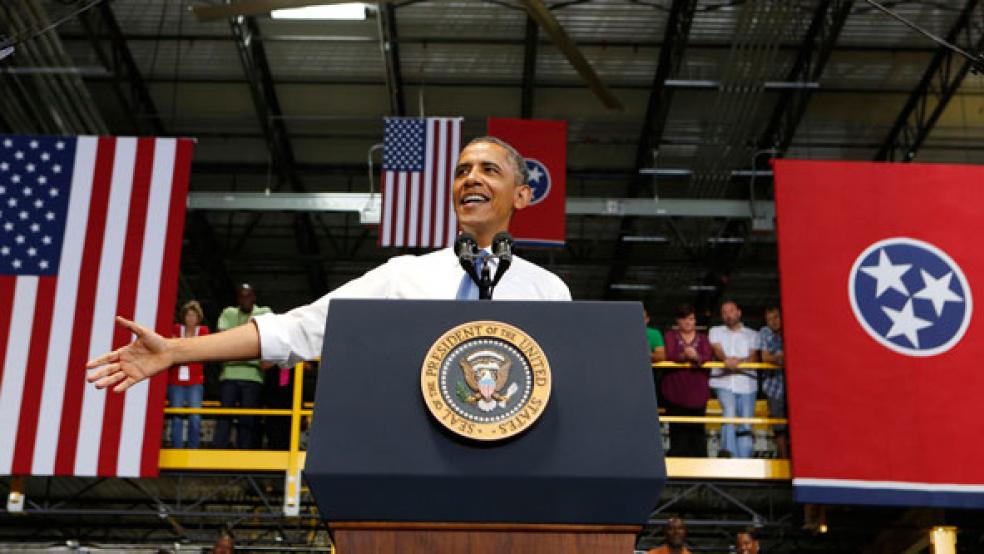
President Obama wisely chose to unveil his new corporate tax reform in Tennessee—because in Washington his so-called “grand bargain” instantly flopped.
Congress was unimpressed by Obama’s policy mash-up of tax rates and infrastructure spending. The business community offered faint praise, if not gentle criticism. This seems to be a recurring pattern for the latest in seven addresses on the economy that Obama began delivering last week as part of a nationwide tour.
At his Tuesday speech in an Amazon.com warehouse in Chattanooga, the president was supposed to be easing the friction on Capitol Hill, instead of highlighting it.
"I've come here to offer a framework that might help break through the political logjam in Washington and get some of these proven ideas moving," Obama said.
He called for lowering the top corporate tax rate from 35 percent to 28 percent, essentially reheating an idea that his Treasury Department first offered back in early 2012. Some loopholes and tax breaks would be eliminated, while the top rate for manufacturers would be 25 percent.
Because these reforms would generate new revenue in the short-term, Obama would use the additional cash to pay for $50 billion in infrastructure spending (a White House initiative from 2010).
The president might be re-staking out his turf, but he also stepped on lots of congressional toes on Tuesday. His speeches, as a result, seem to have generated almost no traction.
Senate Minority Leader Mitch McConnell (R-KY) attacked the reforms in a floor speech as “a further left version of a widely panned plan he already proposed two years ago – this time with extra goodies for tax and spend liberals.”
A spokesman for House Speaker John Boehner (R-OH) dismissed them as “leaving small businesses and American families behind.”
Senate Majority Leader Harry Reid (D-NV) told reporters that Republicans have simply been too inflexible so far on tax reform, saying that Obama has “already done some things that a number of people in my caucus are not wild about. Republicans refuse to come up with anything in writing.”
But the big affront might be to Rep. Dave Camp (R-MI) and Sen. Max Baucus (D-MO), the heads of the two tax-writing committees who have been soliciting ideas for a tax code overhaul from lawmakers, special interests, and average citizens. Their plan would also address income tax reform for individuals.
Baucus and Camp’s approach has been to keep many of these conversations confidential, so that a plan could be formulated without the usual political interference. Baucus said earlier this month that the White House was being kept abreast of their progress, but that it planned to stay out of the spotlight on tax reform in order to encourage bipartisan support.
“If President Obama were to be out front,” Baucus said, “we may have some trouble with some members of the House of Representatives.”
On Tuesday, the senator claimed the “good news” was that the president was “pushing for reform.” But Baucus unenthusiastically viewed the president’s tax ideas as one of many, saying, “It’s just one proposal.”
Republicans see any closing of tax loopholes as a chance to reduce rates, such that the total amount of revenue collected is unchanged. Alabama Sen. Jeff Sessions, the ranking Republican on the Budget Committee, reacted as if Obama had somehow betrayed him.
“In the budget committee last month we had a top Democratic witness who said that the way to fix the corporate tax rate was to reduce rates by closing loopholes, and all the money had to be used to reduce rates,” Sessions said. “That’s been Sen. Baucus’ position, and that’s what the president told us in here last year when he came and spoke to us. He agreed with that principle.”
Obama cannot count on the business community to pressure Republicans for a deal, as they did earlier this year to prevent the federal government from tumbling off the fiscal cliff.
“The president used all the right buzz words but said nothing of substance,” said Martin Regalia, chief economist of the U.S. Chamber of Commerce. “Taxing more to spend more is not a recipe for job growth and does nothing to help American companies compete.”
The White House could not even pick up support from the National Association of Manufacturers, despite targeting their sector with a lower rate. Obama’s grand bargain needed to be a bit grander, since many businesses have their taxes filed through the individual portion of the tax code.
“[S]olutions that pick winners and losers and increases the tax burden on businesses don’t benefit manufacturers,” blogged Aric Newhouse, the group’s senior vice president for policy and government relations. “Tax reform must account for the nearly 70 percent of manufacturers who pay taxes at the individual rate.”





